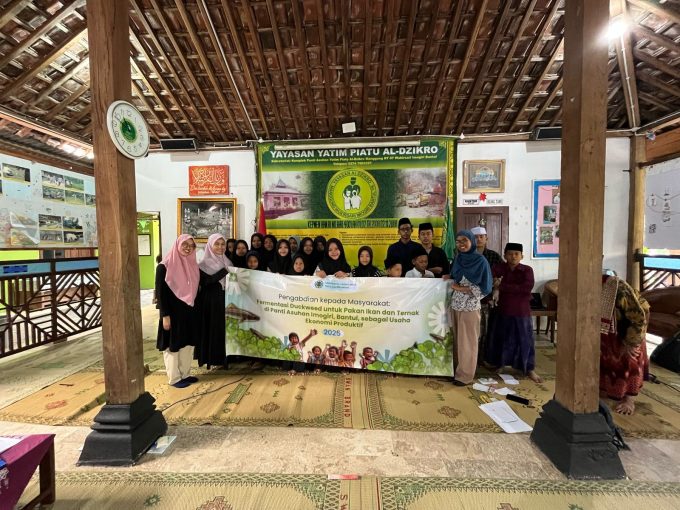
The Faculty of Agriculture, Universitas Gadjah Mada (UGM) once again carried out a community service program by introducing an innovation in the use of fermented duckweed (Lemna sp.) as feed for fish and livestock. The activity was held at the Al-Dzikro Orphanage Foundation, Imogiri, Bantul, as an effort to promote food self-sufficiency while also encouraging productive economic enterprises within the orphanage.
Duckweed, or kiambang, is a high-protein aquatic plant with great potential as an alternative feed source. Through the fermentation process, the nutritional value of duckweed can be enhanced and its digestibility improved, thereby not only reducing feed production costs but also opening new business opportunities based on local resources.
This program was led by Desi Utami, S.P., M.Env.Sc., Ph.D., and involved lecturers from multiple departments, including Prof. Dr. Ir. Alim Isnansetyo, M.Sc., Prof. Ir. Donny Widianto, Ph.D., Prof. Ir. Irfan D. Prijambada, M.Eng., Ph.D., Dr. Desy Putri Handayani, S.Pi., and Susanti Mugi Lestari, S.P., M.Si., Ph.D.
In addition to faculty members, the program also received strong support from undergraduate and postgraduate students, such as Ihza Farras Faadhilah, S.Pi., Samsuri Djamal, S.Pi., Dita Sari Alfiawati Husni, S.Pi., Padia Desi Rahmawati, Nasywa Atha’ala, and Leila Keumala R. These students actively contributed to the practical preparation of fermented feed, technical assistance, and documentation of the activities.

Since its commencement on July 26, 2025, a series of activities have been carried out, including hands-on training in simple fermentation using microbial inoculants, drying processes, and the formulation of duckweed-based feed. Participants were also introduced to the importance of communication, responsibility, and teamwork in developing productive agricultural and aquaculture businesses.
According to team leader Desi Utami, S.P., M.Env.Sc., Ph.D., the initiative was not only aimed at providing technical solutions but also at building a spirit of independence. “We hope that the knowledge shared can be consistently applied, serving as valuable support for the foundation in developing productive business units that benefit both the children and the surrounding community,” she emphasized.
The program also carried educational value. Children at the orphanage were not only introduced to the cultivation and utilization of duckweed but also gained exposure to the academic environment through stories, experiences, and direct interaction with UGM students. This was expected to foster motivation to learn and encourage them to pursue higher education in the future.
Through the innovation of duckweed fermentation, the Al-Dzikro Foundation is expected to develop small-scale aquaculture and livestock farming that is more efficient, competitive, and sustainable. Beyond strengthening food security, this program also enhances entrepreneurial spirit, self-confidence, and social awareness among the orphanage children.
By fostering strong collaboration among lecturers, researchers, and students, this community service initiative highlights UGM’s commitment to supporting the achievement of the Sustainable Development Goals (SDGs), particularly: SDG 1: No Poverty, SDG 2: Zero Hunger, SDG 4: Quality Education, SDG 8: Decent Work and Economic Growth, SDG 12: Responsible Consumption and Production, and SDG 17: Partnerships for the Goals.
